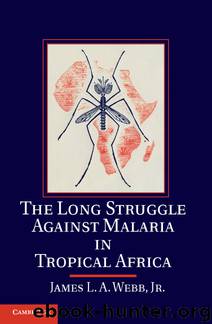The Long Struggle Against Malaria in Tropical Africa by James L. A. Webb Jr

Author:James L. A. Webb, Jr. [Webb]
Language: eng
Format: epub
Publisher: Cambridge University Press
Published: 2014-03-05T16:00:00+00:00
No Clear Path Ahead
International donors grew discouraged. The prospects of relaunching a broad IRS campaign were extremely poor, owing to a lack of African interest and to rising insecticide prices. In 1970, the Malaria Program of the US Centers for Disease Control, whose charge was to help developing countries eliminate malaria by providing technical and financial assistance, was active in eighteen countries. Not one was in tropical Africa.34
Specialists sought workable solutions but encountered formidable social and political issues that lay outside of their fields of technical training. A proposal to encourage African communities to take on a program of self-help that included screening, bed nets, pyrethrum coils and sprays, and antimalarial drugs would have to negotiate in the grand diversity of African rural societies. What seemed possible in the compact villages of northern Nigeria, in which village chiefs and emirs exercised hierarchical control, seemed impossible in the dispersed individual compounds of Kenya.35
In 1976, the United States launched a malaria control program in three of twenty-four urban zones in Kinshasa, Zaire, as well as in a small rural area nearby. It was, in the late 1970s, the only US malaria control program in sub-Saharan Africa. It was declared nonreplicable in 1981. During the short life of the program, some 300,000 urban dwellers and 7,775 rural dwellers were protected by IRS using DDT. The impetus for the project came entirely from the Americans because the government of Zaire had no national health plan and little functioning national health infrastructure. By 1981, the Americans had decided to integrate all future antimalaria measures into the PHC system. There were two problems: the PHC system existed in name only, and the need for specialists to carry out vector control measures was a misfit with the PHC model.36
A broader review of the African malarial situation by the American Public Health Association in 1982 reiterated the consensus of malaria control specialists in the decade before the Kampala Conference in 1950:
Vector control which includes wide-spread chemical control will in Africa be appropriate only in localized areas, for protection of urban and periurban populations; in some of the coastal islands; or under specialized circumstances such as the need to protect strategic areas or groups for economic, social, or political reasons. In such circumstances, operational responsibility of vector control should wherever possible be decentralized to such administrative units as municipalities or productive enterprises. Such activity as chemical control or large-scale environmental management will usually require planning at a higher level, with technical inputs and support from a specialized vector control unit.37
Download
This site does not store any files on its server. We only index and link to content provided by other sites. Please contact the content providers to delete copyright contents if any and email us, we'll remove relevant links or contents immediately.
| Africa | Americas |
| Arctic & Antarctica | Asia |
| Australia & Oceania | Europe |
| Middle East | Russia |
| United States | World |
| Ancient Civilizations | Military |
| Historical Study & Educational Resources |
Goodbye Paradise(3810)
Men at Arms by Terry Pratchett(2839)
Tobruk by Peter Fitzsimons(2518)
Borders by unknow(2315)
Arabs by Eugene Rogan(2301)
Pirate Alley by Terry McKnight(2222)
More Than Words (Sweet Lady Kisses) by Helen West(1867)
Belonging by Unknown(1859)
It's Our Turn to Eat by Michela Wrong(1731)
The Biafra Story by Frederick Forsyth(1656)
The Source by James A. Michener(1615)
Botswana--Culture Smart! by Michael Main(1603)
Coffee: From Bean to Barista by Robert W. Thurston(1547)
A Winter in Arabia by Freya Stark(1539)
Gandhi by Ramachandra Guha(1534)
The Falls by Unknown(1527)
Livingstone by Tim Jeal(1491)
The Shield and The Sword by Ernle Bradford(1410)
Africa: Altered States, Ordinary Miracles by Richard Dowden(1385)
